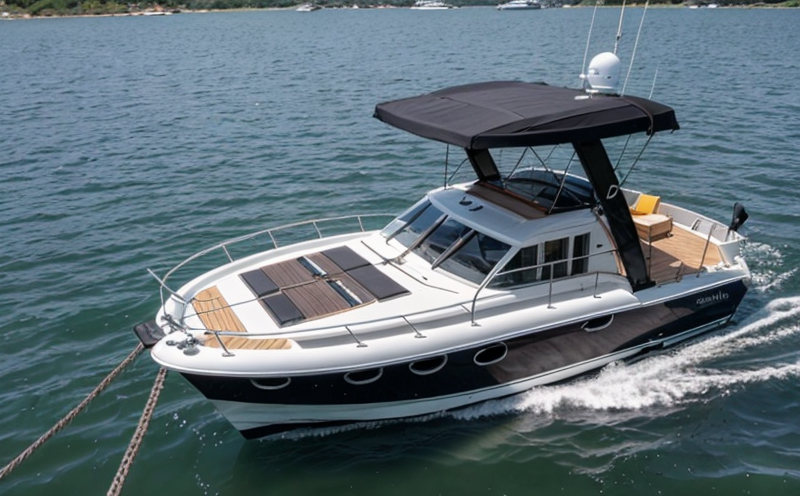ISO 1704 Corrosion Resistance Testing of Anchor Chains
The ISO 1704 standard provides a comprehensive framework for the testing and evaluation of corrosion resistance in anchor chains. This service is particularly critical for marine and ship equipment, where the integrity and reliability of materials are paramount to ensure safety at sea. The stringent requirements laid out by this standard highlight the importance of robust testing protocols that guarantee compliance with international maritime regulations.
The ISO 1704 test method focuses on accelerated corrosion testing techniques designed to simulate real-world environmental conditions that anchor chains face in a marine environment. This includes exposure to saltwater, humidity, and other corrosive elements. The primary objective is to assess the durability of anchor chain materials under these challenging circumstances.
Materials commonly tested include steel alloys such as AISI 316L stainless steel, which are widely used due to their excellent corrosion resistance properties. The test specimens undergo rigorous immersion in saltwater solutions and exposure to climatic chambers that mimic maritime environments. This approach ensures a thorough evaluation of the anchor chain's performance under simulated conditions.
The testing process involves precise sample preparation, including cutting, shaping, and grinding the anchor chain segments to standard dimensions. Once prepared, these samples are subjected to various corrosion tests, including salt spray testing (CASS), cyclic immersion in brine solutions, and exposure to humid atmospheres. The use of advanced instrumentation such as optical microscopes, scanning electron microscopes (SEM), and energy-dispersive X-ray spectroscopy (EDX) provides detailed insights into the material's surface integrity.
The results from these tests are meticulously recorded and analyzed to determine the anchor chain's corrosion resistance capabilities. Compliance with ISO 1704 ensures that the tested materials meet or exceed industry standards, thereby enhancing safety and reliability in marine applications.
By adhering to this standard, manufacturers can ensure their products not only comply with international regulations but also demonstrate superior performance under harsh environmental conditions. This commitment to quality is essential for maintaining trust within the maritime community and ensuring the longevity of ship equipment.
Scope and Methodology
The scope of ISO 1704 testing encompasses a wide range of anchor chain materials, including but not limited to AISI 316L stainless steel. The methodology involves several key steps designed to simulate real-world corrosion conditions:
- Sample Preparation: Anchor chain segments are cut and prepared to standard dimensions suitable for testing.
- Immersion Testing: Prepared samples undergo immersion in saltwater solutions to assess their resistance to corrosive environments.
- Climatic Chamber Exposure: Samples are exposed to humid atmospheres within controlled climatic chambers to simulate maritime conditions.
- Microstructural Analysis: Advanced microscopy techniques, including SEM and EDX, are used to examine the surface integrity of tested materials.
The testing process is designed to provide detailed insights into the corrosion resistance properties of anchor chains. Compliance with ISO 1704 ensures that manufacturers can confidently claim their products meet stringent international standards, enhancing safety and reliability in marine applications.
Competitive Advantage and Market Impact
Increased Safety: Compliance with ISO 1704 testing provides a competitive edge by ensuring products meet or exceed international safety standards. This is crucial in the marine industry, where reliability and longevity are paramount.
- Enhanced Reputation: Companies that comply with this standard can position themselves as leaders in quality and safety within the maritime sector.
- Increased Market Share: By demonstrating superior corrosion resistance properties, companies can attract more customers, thereby increasing their market share.
- Cost Savings: Long-term durability reduces the need for frequent replacements, leading to significant cost savings over time.
The demand for high-quality marine equipment is growing steadily as maritime industries continue to expand. ISO 1704 testing ensures that products meet these demands and exceed customer expectations, thereby driving market growth.
Use Cases and Application Examples
The results from ISO 1704 testing are widely applicable across various maritime sectors. Here are some specific use cases:
- Commercial Shipping: Ensures that anchor chains used in commercial vessels meet the highest safety standards.
- Fishing Vessels: Provides reliable anchor chain solutions for fishing fleets operating in harsh marine environments.
- Oil and Gas Platforms: Supports robust equipment testing to ensure offshore operations are safe and efficient.
- Tugboats and Rescue Boats: Enhances the performance of critical equipment used by these vessels, ensuring they can operate safely under challenging conditions.
The application examples demonstrate how ISO 1704 testing is integral to maintaining safety and reliability in various maritime operations. Compliance with this standard ensures that anchor chains perform reliably under real-world conditions, thereby enhancing the overall safety of marine operations.





